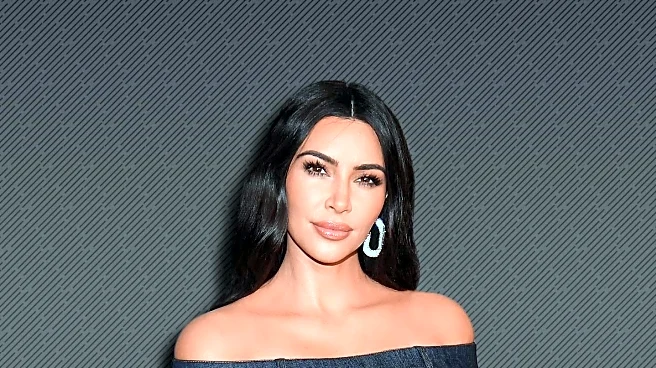What's Happening?
Kim Kardashian's SKIMS brand has introduced a new product, a $32 micro thong featuring faux pubic hair, which has quickly sold out. This launch taps into the growing 'full bush' trend, a movement that encourages embracing natural body hair. The product, available
in 12 shades, has sparked discussions about beauty standards and consumerism. Historically, body hair acceptance has fluctuated, with the 1960s Flower Power era promoting natural beauty, followed by the 1990s trend of hair removal. The current trend reflects a counterculture response to unrealistic beauty ideals and a lack of body autonomy.
Why It's Important?
The introduction of the faux bush thong by SKIMS highlights the ongoing debate over beauty standards and body autonomy. This product launch is significant as it reflects a shift in societal attitudes towards body hair, challenging long-standing norms that have often pressured women to conform to hairless ideals. The trend towards embracing natural body hair can be seen as a form of empowerment, allowing individuals to define beauty on their own terms. However, the commercialization of this trend raises questions about the role of consumerism in shaping cultural movements and whether such products genuinely support empowerment or merely capitalize on it.
What's Next?
As the 'full bush' trend gains momentum, it is likely that more brands will introduce products that align with this movement. The fashion and beauty industries may continue to explore ways to cater to consumers seeking authenticity and self-expression. Additionally, there may be increased dialogue around the implications of commercializing body positivity and whether such efforts truly support the movement or exploit it for profit. Stakeholders, including consumers and advocacy groups, may push for more transparency and authenticity in how brands approach empowerment and body positivity.
Beyond the Headlines
The faux bush thong's popularity underscores a broader cultural shift towards questioning and redefining beauty standards. This trend may influence not only fashion and beauty but also broader societal attitudes towards body image and self-acceptance. The conversation around body hair and empowerment could lead to more inclusive and diverse representations in media and advertising, challenging traditional norms and promoting a more holistic view of beauty. Additionally, this development may inspire further discussions on the intersection of consumerism and cultural movements, examining how brands can authentically support social change.















